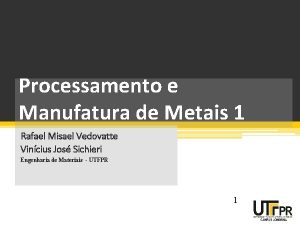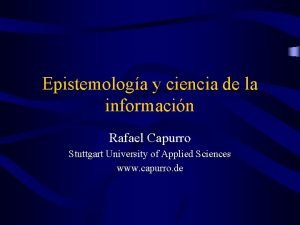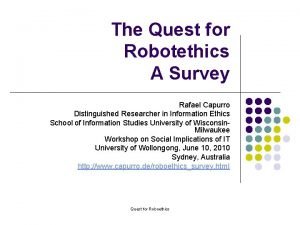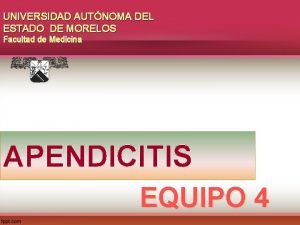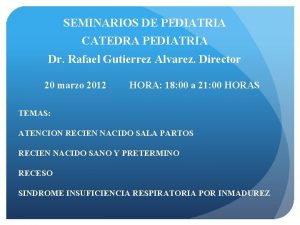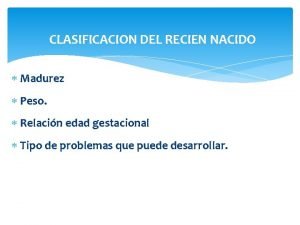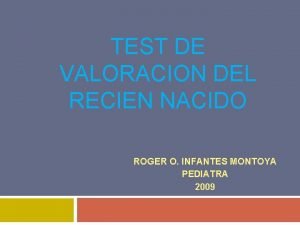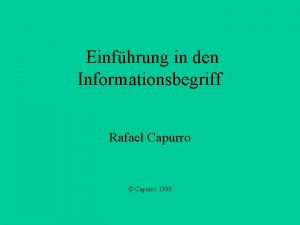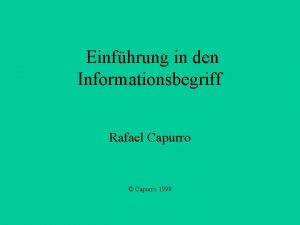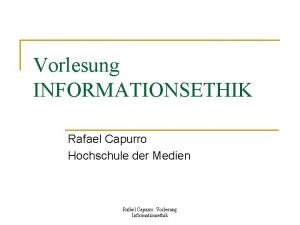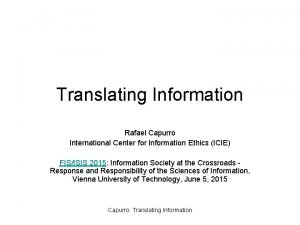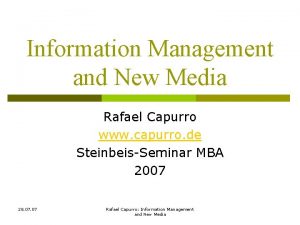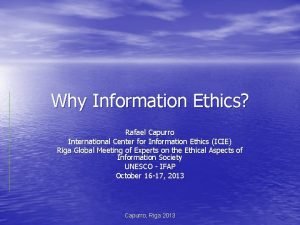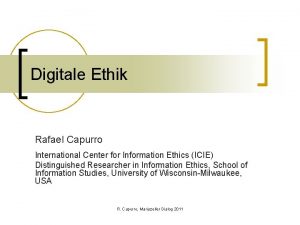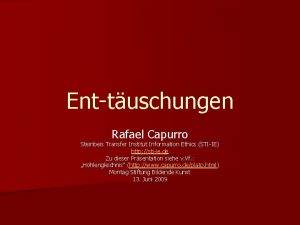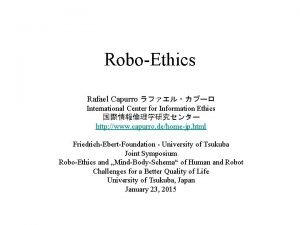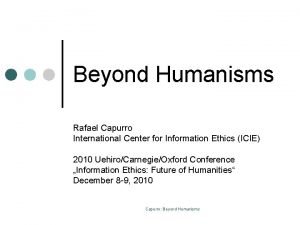The Concept of Information Rafael Capurro www capurro












- Slides: 12

The Concept of Information Rafael Capurro www. capurro. de Copenhagen, 2001

Contents Introduction 1. Studies and sources of the word information 2. Information as an interdisciplinary concept 3. Information in information science Conclusion References 2

Introduction • Language and/as information (Weizsäcker) • Theory dependency of scientific terms (Popper/Kuhn) • A social view of meaning (Wittgenstein) • Higher-level and lower-level practices 3

1. Studies and sources of the word information • • • OED Samuel Johnson (1755) Latin roots: informatio/informo Greek origins: typos, morphe, eidos, idea Modern and postmodern uses 4

2. Information as an interdisciplinary concept • Information: A knowledge process or a property of beings? • Machlup and Mansfield: Information as a human phenomenon • Shannon: Information is not meaning • The concept of information in the natural sciences: Kornwachs/Jacoby, Weiszäcker, Mahler, Stonier, Matsuno 5

2. Information as an interdisciplinary concept (cont. ) • The concept of information in the humanities and social sciences: – Qvortrup, Bar-Hillel, Carnap, Bateson – Dretske, Barwise and Perry, Israel and Perry, Pérez Gutierrez – Oeser, von Foerster, Luhmann – Bell, Schiller, Habemas, Baudrillard, Giddens, Vattimo, Poster, Lyotard, Castells – Nonaka and Takeuchi, Von Krogh 6

3. Information in information science • • Librarianship and scientific documentation IR and the concept of information Information as pieces of facts Theories of information in IS 7

Conclusion • • Shannon’s heritage Naturalists vs culturalists Borgmann Fleissner and Hofkirchner: “Capurro’s trilemma” • Networked observers and actors 8

References Barwise, J. , Perry, J. (1983). Situations and Attitudes. Cambridge, Mass. Bateson, G. (1972). Steps to an Ecology of Mind. New York. Bell, D. (1973). The Coming of the Post-Industrial Society. Harmondsworth. Borgmann, A. (1999). Holding on to Reality. Univ. of Chicago Press. Capurro, R. . (1978). Information. München. Available: http: //www. capurro. de/info. html - (2001). Informationsbegriffe und ihre Bedeutungsnetze. Ethik und Sozialwissenschaften 12/2001, 1, 14 -17. Available: http: //www. capurro. de/ropohl. htm -, Fleissner, P. , Hofkirchner, W. (1999): Is a Unified Theory of Information Feasible? A Trialogue. In Hofkirchner, W. Ed. , The Quest for a Unified Theory of Information. Amsterdam. Available: 9 http: //www. capurro. de/trialog. htm

References (cont. ) Castells, M. (1996 -1998). The Information Age - Economy, Society, Culture. 3 Vol. , Oxford. Conrad, M. , Marijuan, P. C. Eds. (1996). Proceedings of the First Conference on Foundations of Information Science. Bio Systems 38, 87 -266. Dretske, F. I. (1981). Knowledge & the Flow of Information. Cambridge. Fleissner, P. , Hofkirchner, W. (1999). Informatio Revisited. Informatik. Forum 8, 126 -131. Hofkirchner, W. Ed. (1999). The Quest for a Unified Theory of Information. Amsterdam. HjØrland, B. , Capurro, R. (2002). The Concept of Information. ARIST (in prep. ) 10

References (cont. ) Janich, P. (1998). Informationsbegriff und methodisch-kulturalistische Philosophie. Ethik und Sozialwissenschaften, 2, 169 -182. Kornwachs, K. , Jacoby, K. (1996). Information. New Questions to a Multidisciplinary Concept. Berlin. Luhmann, N. (1987). Soziale Systeme. Frankfurt a. M. Machlup, F. , Mansfield, U. (1983). The Study of Information. Interdisciplianry Messages. New York. Matsuno, K. (2000). Dynamics of time and information in a dynamic time. Bio. Systems 46, 57 -71. Nonaka, I. , Takeuchi, H. (1995). The Knowledge-Creating Company. New York. Peters, J. D. (1988). Information. Notes Toward a Critical History. Journal of Communication Inquiry, 12, 10 -24. 11

References (cont. ) Pérez Gutierrez, M. (2000). El fenómeno de la información. Madrid. Qvortrup, L. (1993). The Controversy over the Concept of Information. Cybernetics & Human Knowing 1, 3 -24. Ropohl, G. (2001). Der Informationsbegriff im Kulturstreit. Ethik und Sozialwissenschaften, 12/2001, 1, 3 -14. Shannon, C. , Weaver, W. (1949). The Mathematical Theory of Communication. Urbana. Stonier, T. (1990). Information and the Internal Structure of the Universe. London. Völz, H. (1982/1983): Information. 2 Vol. , Berlin. Von Krogh, G. , Ichijo, K. , Nonaka, I. (2000). Enabling Knowledge Creation. Oxford. Weizsäcker, C. F. v. (1974). Die Einheit der Natur. München. Wittgenstein, L. (1958). Philosophical Investigations. Oxford. 12
